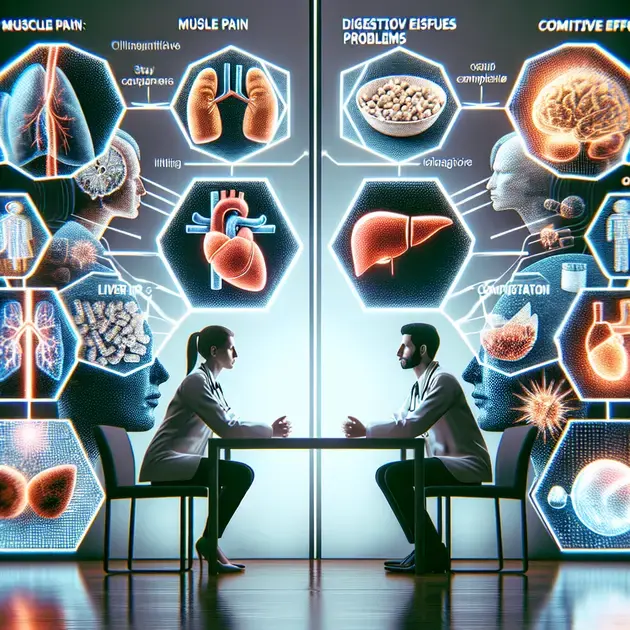Understanding the side effects of cholesterol drugs is crucial for individuals who are prescribed this type of medication to manage their cholesterol levels. With the increasing prevalence of heart disease and related conditions, the use of cholesterol-lowering drugs has become widespread in recent years.
Research has shown that while these medications can effectively reduce cholesterol levels and lower the risk of cardiovascular events, they may also come with a range of side effects that patients need to be aware of. By understanding the potential side effects of cholesterol drugs, individuals can make informed decisions about their treatment plans and work closely with their healthcare providers to manage any adverse reactions that may arise.

Potential Side Effects of Cholesterol Drugs
When taking cholesterol drugs, it’s important to be aware of the potential side effects that may occur. These medications can have various effects on different individuals, so it’s crucial to monitor your body’s response. Here are some common side effects to watch out for:
1. Muscle Pain
One of the potential side effects of cholesterol drugs is muscle pain or weakness. If you experience persistent muscle pain while taking these medications, it’s essential to consult your healthcare provider immediately. They may suggest adjusting your dosage or switching to a different type of cholesterol drug.
2. Digestive Issues
Some individuals may experience digestive problems such as nausea, vomiting, or diarrhea when taking cholesterol drugs. To manage these side effects, you can try taking the medication with food or adjusting the timing of your doses. If the digestive issues persist, speak to your doctor for further guidance.
3. Liver Problems
In rare cases, cholesterol drugs can lead to liver abnormalities or liver damage. It’s crucial to undergo regular liver function tests while on these medications to monitor any potential issues. If you notice symptoms such as jaundice or abdominal pain, seek medical attention immediately.
4. Cognitive Effects
Some individuals may experience cognitive side effects such as memory loss or confusion when taking cholesterol drugs. If you notice any changes in your cognitive function, report them to your healthcare provider promptly. They can assess the situation and recommend appropriate steps to manage these effects.
5. Allergic Reactions
In rare cases, cholesterol drugs can trigger allergic reactions ranging from mild rashes to severe anaphylaxis. If you develop any signs of an allergic reaction, such as hives, difficulty breathing, or swelling of the face and throat, seek immediate medical help.
Common Side Effects to Watch Out For
Managing side effects when taking cholesterol drugs is essential for your overall well-being. Here are some tips to help you navigate and cope with these potential effects:
1. Communication with Your Doctor
Keep an open line of communication with your healthcare provider regarding any side effects you experience. They can provide guidance on how to manage these effects effectively and may recommend alternative treatments if necessary.
2. Follow Prescribed Dosages
Adhering to the prescribed dosages of cholesterol drugs is crucial to minimize side effects. Avoid self-adjusting your medication without consulting your doctor, as this can lead to adverse reactions.
3. Healthy Lifestyle Choices
Support your cholesterol treatment by maintaining a healthy lifestyle. Incorporate regular exercise, a balanced diet, and stress management techniques into your daily routine to enhance the effectiveness of the medication and reduce potential side effects.
4. Monitor and Report Side Effects
Keep a journal to track any side effects you experience while taking cholesterol drugs. Note the severity and duration of the symptoms and share this information with your healthcare provider during follow-up appointments.
5. Seek Support
If you find it challenging to cope with the side effects of cholesterol drugs, consider joining a support group or seeking counseling to discuss your concerns and connect with others facing similar challenges.

Managing Your Cholesterol Medication
When it comes to managing your cholesterol, medication can play a crucial role in keeping your levels in check. Cholesterol-lowering drugs, such as statins, are commonly prescribed to help lower LDL (bad) cholesterol and reduce the risk of heart disease. It’s important to follow your doctor’s recommendations regarding medication dosage and frequency to effectively manage your cholesterol levels. Additionally, making lifestyle changes like adopting a healthy diet and exercising regularly can complement the benefits of medication.
One key consideration when taking cholesterol medication is consistency. It’s essential to take your medication as prescribed by your healthcare provider. Missing doses or irregular usage can impact the effectiveness of the medication and may not provide the desired results in lowering cholesterol levels. Setting reminders or incorporating medication intake into your daily routine can help ensure consistency.
Monitoring your cholesterol levels regularly is another important aspect of managing your medication. Your doctor may recommend periodic blood tests to assess the impact of the medication on your cholesterol levels. These tests can help determine if any adjustments to your medication regimen are necessary to achieve optimal results. Open communication with your healthcare provider regarding any concerns or changes in your health is vital for effective cholesterol management.
Understanding the potential side effects of cholesterol medication is also crucial. While these drugs are generally safe and well-tolerated, some individuals may experience adverse reactions. Common side effects may include muscle pain, digestive issues, or liver abnormalities. It’s important to report any unusual symptoms to your doctor promptly to address them and ensure your safety while taking cholesterol medication.
In conclusion, managing your cholesterol medication involves consistent usage, regular monitoring, and open communication with your healthcare provider. By following your doctor’s guidance, adopting a healthy lifestyle, and staying informed about potential side effects, you can effectively control your cholesterol levels and reduce the risk of heart disease.
Recognizing Adverse Reactions to Cholesterol Drugs
Recognizing adverse reactions to cholesterol drugs is essential for ensuring your health and safety while undergoing cholesterol management. While these medications are designed to lower cholesterol and decrease the risk of heart disease, some individuals may experience unwanted side effects. Being aware of the potential adverse reactions can help you address them promptly and seek medical assistance if needed.
One common adverse reaction to cholesterol drugs is muscle pain or weakness. This can manifest as soreness, cramping, or difficulty in movement. If you notice persistent muscle discomfort while taking cholesterol medication, it’s important to notify your healthcare provider. They may adjust your dosage or recommend alternative medications to alleviate this side effect.
Another potential adverse reaction is digestive issues, such as nausea, diarrhea, or constipation. These symptoms can impact your comfort and well-being. If you experience persistent digestive problems while on cholesterol medication, consulting with your doctor can help identify the underlying cause and determine the appropriate course of action.
Liver abnormalities are another concern when taking cholesterol drugs. Monitoring liver function through blood tests is typically recommended to detect any potential issues early on. Changes in liver enzymes levels may indicate liver toxicity, which requires immediate medical attention. Reporting any signs of jaundice, abdominal pain, or unexplained fatigue is crucial in recognizing liver-related adverse reactions.
In conclusion, recognizing adverse reactions to cholesterol drugs involves being vigilant about changes in your body and seeking medical advice when necessary. By staying informed about potential side effects, monitoring your health proactively, and communicating openly with your healthcare provider, you can minimize the risks associated with cholesterol medication and maintain your well-being.
Conclusion
In managing your cholesterol medication, consistency is key. Following your doctor’s guidance on dosage and frequency, along with adopting a healthy lifestyle, can help you effectively control your cholesterol levels and reduce the risk of heart disease. It is essential to take your medication regularly as prescribed to ensure its effectiveness in lowering cholesterol levels. Setting reminders and incorporating medication intake into your daily routine can aid in maintaining consistency.
Regular monitoring of your cholesterol levels is crucial for managing your medication. Periodic blood tests recommended by your doctor can assess the impact of the medication and indicate if any adjustments to your regimen are necessary for optimal results. Open communication with your healthcare provider regarding any concerns or changes in your health plays a vital role in effective cholesterol management.
Recognizing adverse reactions to cholesterol drugs is equally important. Being vigilant about potential side effects such as muscle pain, digestive issues, and liver abnormalities can help address them promptly. If you experience persistent symptoms, seeking medical advice is essential for your health and safety. By staying informed about possible side effects, monitoring your well-being, and openly communicating with your healthcare provider, you can minimize risks associated with cholesterol medication and maintain overall well-being.